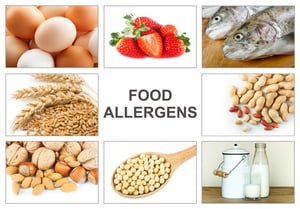 Are food allergies affecting the cost of your restaurant liability insurance? Maybe.
Are food allergies affecting the cost of your restaurant liability insurance? Maybe.
In the U.S., about 15 million people have food allergies, and food allergic reactions are responsible for approximately 30,000 emergency room visits and 150-200 deaths every year, according to the Environmental Health Specialists Network (EHS-Net). Over a thirteen-year period, nearly half of all fatal food allergy reactions were caused by food from restaurants or other food establishments.
What if one of those reactions was a result of something that person ate at your restaurant? Are you liable? Again, maybe!
So far, five states have enacted laws to make it safer for individuals with food allergies to eat at restaurants. While Pennsylvania is not one of those states, that doesn’t mean that you couldn’t find yourself on the wrong end of a lawsuit, which could affect not only your restaurant's liability insurance rates but also your restaurant’s reputation.
What is a Food Allergy?
The Mayo Clinic defines a food allergy as “an immune system reaction that occurs soon after eating a certain food. Even a tiny amount of the allergy-causing food can trigger signs and symptoms such as digestive problems, hives, or swollen airways. In some people, a food allergy can cause severe symptoms or even a life-threatening reaction known as anaphylaxis.”
Symptoms can begin within a few minutes or up to two hours and can include one or more of the following:
- Hives
- Flushed skin or rash
- Tingling or itchy sensation in the mouth
- Face, tongue, or lip swelling
- Vomiting and/or diarrhea
- Abdominal cramps
- Coughing or wheezing
- Dizziness and/or lightheadedness
- Swelling of the throat and vocal cords
- Difficulty breathing
- Loss of consciousness
According to the Food and Drug Administration (FDA), there are more than 160 foods that can cause an allergic reaction, but eight foods account for 90 percent of all food allergy reactions. Those eight major food allergens include the following:
- Milk
- Eggs
- Fish (e.g., bass, flounder, cod)
- Crustacean shellfish (e.g., crab, lobster, shrimp)
- Tree nuts (e.g., almonds, walnuts, pecans)
- Peanuts
- Wheat
- Soybeans
What do Restaurant Employees Know About Food Allergies?
A study conducted by the EHS-Net discovered that while most restaurant managers, workers, and servers were familiar with food allergies, there were significant gaps in that knowledge. This isn’t surprising since less than fifty percent of those interviewed had received food allergy training.
For the most part, restaurant employees could recognize the symptoms of an allergic reaction and knew to call 911 if a reaction occurred.
However, one in ten were under the false assumption that someone with a food allergy could eat a small amount of an allergen without experiencing any adverse effects. The study also concluded that while most restaurants make ingredient lists available, many of them did not take other steps – such as avoiding cross food contamination – to reduce the risk of allergic reactions.
What Your Restaurant Can Do to Ensure the Safety of Customers With Food Allergies
The EHS-Net recommends that restaurants do the following:
- Train staff on food allergies including identifying major food allergens, how to prevent cross-contamination of allergens, and what to do if a customer has an allergic reaction
- Have a designated person on duty at all times to handle food allergy questions and requests
- Keep ingredient lists or recipes for menu items available for customers
- Use dedicated areas and equipment to prep and cook meals for customers with food allergies
- If this isn’t possible, clean prep areas and equipment before preparing meals for customers with food allergies
If taking a few steps can help ensure the safety of your customers and help minimize the possibility of a lawsuit and the adverse effects that go with it, isn’t it worth the effort? Lowering your restaurant liability insurance is just icing on the cake.
We Specialize in Restaurant Insurance
If you want to save even more on your restaurant insurance, give one of the agents at American Insuring Group who specialize in restaurant insurance a call at (800) 947-1270 or (610) 775-3848 or connect with us online.







